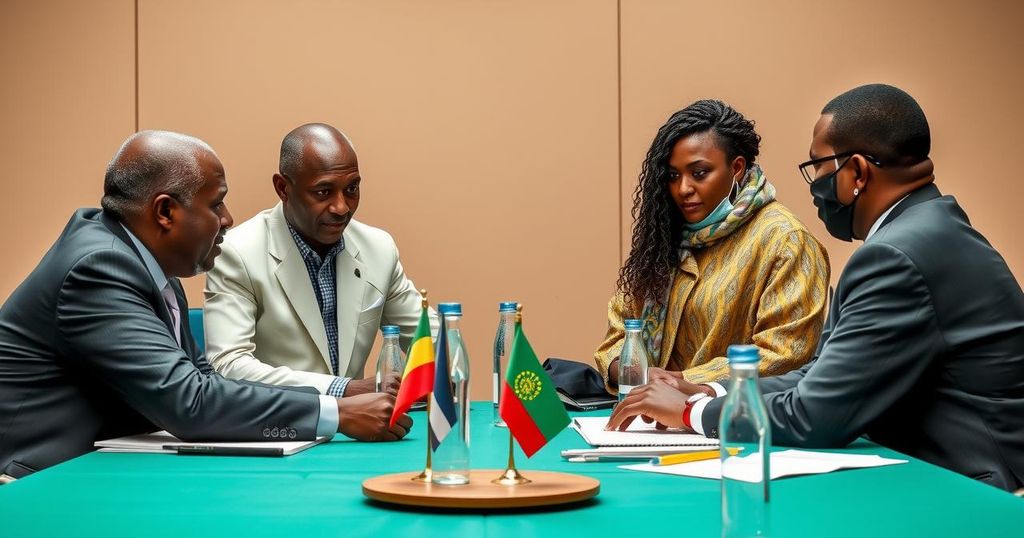Ethiopia and Somalia have agreed to commence “technical talks” regarding the breakaway Somaliland region. Mediation by Turkey has facilitated this agreement in response to tensions arising from Ethiopia’s military and recognition deal with Somaliland. The talks will focus on respecting Somalia’s territorial sovereignty while exploring beneficial access to sea routes for Ethiopia, with an aim to foster regional stability and cooperation.
Ethiopia and Somalia have agreed to initiate “technical talks” aimed at resolving tensions surrounding Somaliland, which declared independence from Somalia over three decades ago. This agreement, reached during discussions mediated by Turkey, follows Ethiopia’s recent memorandum with Somaliland that entails leasing coastal land for military purposes, while also implying acknowledgment of Somaliland’s autonomy. The planned dialogue is set to commence by February 2025, with an emphasis on respecting Somalia’s territorial integrity and exploring commercial agreements beneficial for Ethiopia’s access to maritime routes.
Turkish President Recep Tayyip Erdogan emphasized the importance of cooperation between Ethiopia and Somalia, indicating that the joint declaration marks a significant step towards addressing their disputes. Both leaders expressed hopes for collaborative efforts that would foster stability in the Horn of Africa. Ethiopia, the continent’s most populous landlocked nation, has pursued access to the sea to improve economic ties and regional relations. Notably, Somaliland, having established a stable governance model, remains unrecognized internationally, complicating its claims to independence.
Previously, Turkey facilitated discussions between these nations that sought to mitigate escalating tensions. The involvement of Turkey reflects its deepening diplomatic relations with both Somalia and Ethiopia, which include agreements on defense and economic cooperation. Amidst this backdrop, the recent election of a new Somaliland opposition leader could reshape the political landscape and influence future engagements concerning accession to maritime access.
As stated by Ethiopian Prime Minister Abiy Ahmed, “Ethiopia’s aspiration for secure access to the sea is a peaceful venture and one that would benefit all our neighbors.” Somalia’s President Hassan Sheik Mohamud reinforced the notion of regional cooperation, acknowledging the inherent volatility of the Horn of Africa and the necessity of collaborative efforts between the two nations to promote security and stability.
In conclusion, the agreement to hold talks reflects a hopeful shift towards resolution for longstanding disputes in the region, with both Ethiopia and Somalia prepared to invest in a common future of peace and prosperity. Engagement facilitated by Turkey may pave the way for a more integrated approach to regional challenges, ultimately benefiting the broader East African community.
The historical context of the Ethiopia-Somalia relationship is marred by conflict over territorial integrity and the status of Somaliland. Somaliland proclaimed independence from Somalia in 1991, yet lacks broader recognition as a sovereign state, leading to ongoing disputes over its legitimacy. Ethiopia’s recognition of Somaliland’s independence, particularly through a recent agreement to lease land for a military base, has exacerbated tensions with Somalia, which perceives this as an infringement on its territorial sovereignty. Turkey has emerged as a mediator in this dispute, symbolizing its strategic interests in the Horn of Africa and its commitment to fostering stability in the region.
The dialogues set to unfold between Ethiopia and Somalia represent a pivotal opportunity to address historical tensions and pave the way for productive collaboration concerning the Somaliland issue. By recognizing the need for mutual respect and seeking to enhance economic ties, both nations stand to benefit. Turkey’s role as a mediator is significant, as it seeks to bolster regional stability in a historically volatile area, fostering peace and cooperation that can lead to economic growth and enhanced security in the Horn of Africa.
Original Source: apnews.com






